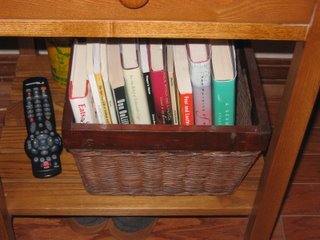The discomfort of clearing out the bookshelves
 There is a decent collection of books about film, music, and related subjects
There is a decent collection of books about film, music, and related subjects Soon (I apply the term loosely)-to-be-read books in a basket on the nightstand
Soon (I apply the term loosely)-to-be-read books in a basket on the nightstandThere are books all over this house--gardening books on an Oriental-inspired English-type bookcase in the living room, unclassifiable (and largely unnoticed) books on a bookcase behind the sofa, huge books in a jute crate near the fireplace, more huge books on a Mexican pedestal in the dining room, cookbooks in a basket on the kitchen counter, more books in a basket on the second shelf of the nightstand (I knew a woman whose husband referred to her nightstand as "the black hole of literature"), books in bookcases in my husband's office, and more books in there awaiting their new home on a revolving bookcase.
But they are not the problem. The problem is the set of four tall bookcases in my home office. Every couple of years, I go through them to see what I can get rid of, usually giving them to the prisoners at Angola. It is a painful process, partly because I cannot stand to part with a book, partly because it is tedious manual labor, but perhaps mostly because of the guilt created by the task.
A few years ago, I took all of my work-related books and hauled them to my office (the one where I go to work), bought a new bookcase, and set them up in there. I rarely look at one, but I'm not ready to get rid of them, and they make a fine addition to the office. A few years before that, I forced myself to get rid of my collection of public speaking textbooks. I haven't taught in years, and they were just taking up valuable space in a house that has a minimum of places to store things.
And so it goes. I do not own that many books, but the ones I do own take up so much space. Every time I perform this dreaded task, I get rid of dozens of books, and sometimes entire categories of books. This time, I let go of my complete Robert B. Parker set (Spenser and others), my complete Julie Smith Skip Langdon and Talba Wallis sets, and my complete Linda Barnes set. I also tossed out books in every other category except drama, poetry, and classic and modern literary fiction. I did it because I needed to have space for new books, and I also needed more space for other items on the shelves, since my home office is small and every nook and cranny is occupied with pens, ink, cds, stationery, literary magazines, office supplies, and electronic parts.
So there I was, wiping down the shelves, sneezing from the dust, and forced to look at all the books I have bought and never read: Ironweed, Woman on the Edge of Time (I have, however, read several other Piercy novels), Paris Trout, Mountain Windsong. The Mary Gordon novel that I have started three times but have never gotten beyond the first one hundred pages of (I generally can't put her novels down). A collection of essays by the wonderful Otto Friedrich. As an adult, I am not a very well-read person. When I was an adolescent, I was extremely well-read, but something happened. The things I haven't read would shock you, and I won't embarrass myself by revealing them here. In many cases, I have read only one of a famous author's books; in other cases, I have read none at all. And of course, I have forgotten the dozens of classic novels I read when I was young, though I feel they must somehow be part of my consciousness.
There were also books people had given me that I had never read: novels by Barbara Kingsolver, Tony Hillerman, Iris Murdoch. An Aldous Huxley (my favorite novelist in high school) novel given to me over thirty years ago that I have yet to read. A book about Gertrude Stein and friends, and biographies of Carson McCullers, and Grace Kelly.
It was an ugly job, though my office bookshelves look a lot better today. The fact of the matter is that there are dozens more books I could get rid of--books about political events, books about language, books about miscellanous topics--that I will probably never read, or even look at, again, but I cannot bear to part with them. Not at this time, anyway. And even my prized shelves of biographies and books about film and music may never get a second reading, but they are treasures.
I am currently re-reading To the Lighthouse, and when I finish, I will have to decide whether to proceed with the books in my nightstand basket or take the plunge and try one of the unread items haunting me from yesterday's task. "So many books, so little time," the saying goes, but it helps if you actually take the time to read.





0 Comments:
Post a Comment
<< Home